‘The Hobbit’ Story Group 10: A Warm Welcome
Surely this would have been the halfway point of the original two-part film version of The Hobbit. (Pause for fiends to grumble about Peter Jackson only wanting to make money, etc.) Now that that’s done, let’s consider the story’s shift from a road-trip quest, from The Shire to the Lonely Mountain, to a fixed-place structure — Lake-town and the lost Mountain.
Starting in chapter 9’s last section, Tolkien himself notes the change: “Now we are drawing near the end of the eastward journey and coming to the last and greatest adventure, so we must hurry on.” To me it feels like the narrator himself was quite done with the road-trip portion and was ready to tackle some more-advanced material. And here, I believe, Tolkien purists may expect more-faithful adaptation in The Hobbit: The Desolation of Smaug.
Why do I say that? Because those who refer to The Hobbit as only a children’s story, or even as intentionally less mature than The Lord of the Rings, need to read a bit more carefully. In the book’s final chapters, Tolkien tests the limits of his modified fairy-tale even more.
Here in chapter 10 alone we have small-town characters and crowds, conflicting interests of different groups that later develop into very modern-feeling political standoffs, a slick and disreputable leader who wants to preserve the status quo but also feign to endorse old legends, and even Tolkien’s own satirical send-up of the returning-king archetype!
Unlike chapter 9, all this is very visible, very familiar and yet fantastical, and well worth more-faithful adaptation for the film. I’m sure I’ll put up fine with the added character of Tauriel, frivolous elf-and/or-dwarf-and/or-goblin battles, etc. But don’t change Lake-town.
Even if they do, of course, the book’s chapter remains for our enjoyment, so let’s discuss!
Chapter 10: A Warm Welcome
- Read chapter 10 in its entirety.
- When the dwarves finally emerge from their barrels, starting with Thorin, whose “side” does the author take — Bilbo’s or theirs in their cooped-up (ha! get it?) misery? Perhaps [Bilbo] had forgotten that he had had at least one good meal more than the dwarves, and also the use of his arms and legs, not to speak of a greater allowance of air (page 180).
- “Well! Here we are!” said Thorin. “And I suppose we ought to thank our stars and Mr Baggins. I am sure he has a right to expect it, though I wish he could have arranged a more comfortable journey.” (page 181) How has Thorin’s view of Bilbo changed?
-
In this chapter Tolkien makes several mentions of generational differences: the old people who still remember the legends of dwarves living under the mountain; the young people to whom the legends are more vague and who even doubt a dragon lives under the mountain. Some of the more foolish ran out of the hut as if they expected the Mountain to go golden in the night and all the waters of the lake turn yellow right away (page 182). What do you think of these differences? How do they reflect in reality?
- The “return of a king from ancient times” theme runs strong in many fairy tales. How does Tolkien treat it here — seriously or otherwise? Why do you think this theme is so prevalent? How do the people of Laketown react to the possibility that a king returned?
- Thorin looked and walked as if his kingdom was already regained and Smaug chopped up into little pieces. (page 187) Is there some moral implicit in this attitude of Thorin’s and the dwarves? Or (my thought) might Tolkien be having a little fun with how the return of an ancient king might look in a very human culture if things were more “realistic”?
- … He was a wise elf and wiser than the men of the town, though not quite right, as we shall see in the end. (page 187) Thranduil, the Elf-king: is he a “good guy,” or “bad guy,” or somewhere in between? How do you feel about “ambiguous” characters in stories? How do Christians typically react to such figures, in our preferences and stories? How does Scripture treat people, whether heroes or villains: good, bad, or in many ways mixed?
What about the Master of Laketown and his reaction to Thorin’s return? If he is bad guy, do we at least see his point; do his motives make sense apart from pure evil? How does the fact that he is less of an overt villain in effect add even more tension to the story?
































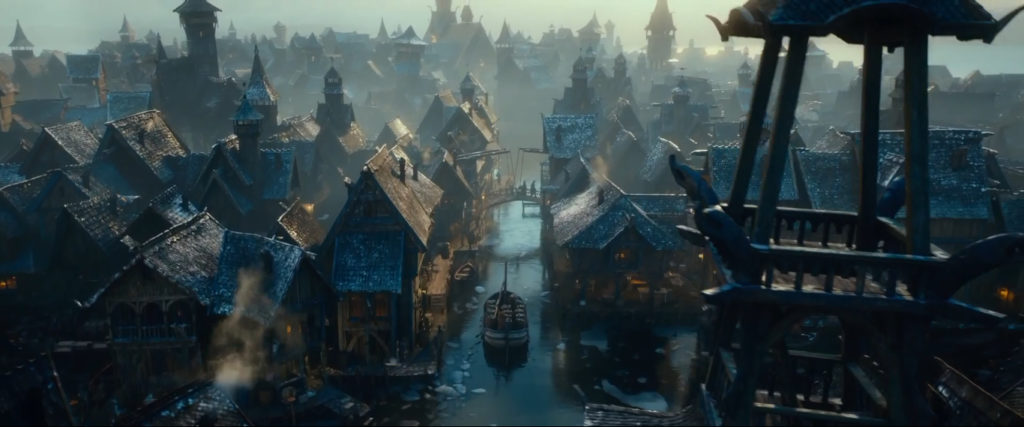

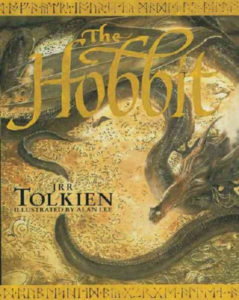
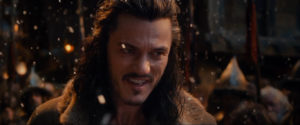

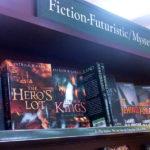
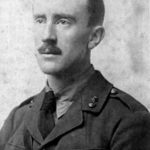
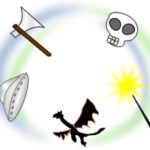





There’s a joke going around that The Hobbit is Gandalf’s trial run at returning a King to his throne. I hadn’t thought about the “realism” of either attempt, but the skepticism of the Lake-Master could be contrasted with Denethor’s attitude towards Aragorn (though the movie gives Aragorn a totally different attitude than the book).
And here’s this, from Variety‘s new (and spoiler-laden) review of The Hobbit: The Desolation of Smaug:
So far at least these elements of the film sound like faithful adaptation of the source material — which, at this point in the story, is quite “grown-up” stuff.